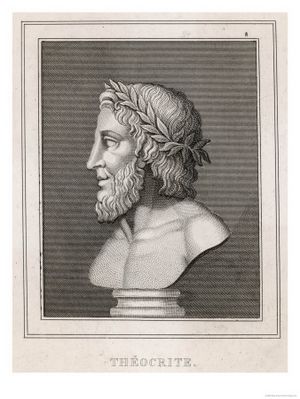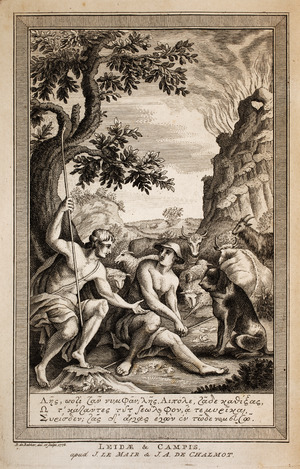Theocritus facts for kids
Quick facts for kids
Theocritus
|
|
|---|---|
 |
|
| Born | c. 300 BC Syracuse |
| Died | After 260 BC |
| Occupation | Poet |
| Nationality | Greek |
| Genre | Pastoral poetry, epic poetry |
Theocritus was an ancient Greek poet. He lived around 300 BC to 260 BC. He is famous for creating a type of poetry called pastoral poetry. This kind of poetry often describes simple country life and shepherds.
Contents
The Life of Theocritus
We don't know much about Theocritus's life. Most of what we know comes from his poems. But we have to be careful, because some poems thought to be his might not actually be.
It's clear that people collected his poems very early on. Some collections included poems that were probably not by him. Other collections were only his true works.
Theocritus was from Sicily. He called Polyphemus, a giant from the Odyssey, his "countryman." He also likely lived in Alexandria for a while. There, he wrote about everyday life.
People believe Theocritus was born in Syracuse. He might have lived on the island of Kos. He also lived in Egypt when Ptolemy II was king.
One old poem says he was from Syracuse. It also says his parents were Praxagoras and Philinna. This information seems correct.
The Works of Theocritus
Theocritus wrote different kinds of poems. His most famous ones are called Idylls.
Country Poems and City Scenes
Theocritus wrote poems about country life, called Bucolics. He also wrote poems about city life, called mimes.
Famous Country Poems
Some of his most famous country poems are Idylls 1, 6, 7, and 11.
In "Idyll 1," a shepherd named Thyrsis sings about Daphnis. Daphnis was a mythical herdsman. He refused to fall in love with the goddess Aphrodite. Because of this, he died. Gods like Hermes and Priapus tried to help him. But Daphnis still died, showing that mortals should not challenge the gods.
In "Idyll 11," Polyphemus is in love with the sea-nymph Galatea. He sings songs to feel better. In "Idyll 6," he gets over his love. He even talks about how he now ignores Galatea. The fierce giant from Homer's Odyssey becomes a gentle, simple character in Theocritus's poems.
"Idyll 7," called the Harvest Feast, is very important. It takes place on the island of Kos. The poet tells the story himself. He calls himself Simichidas. Other poets appear in the poem with made-up names. Theocritus says he is already famous. He also praises older poets and criticizes new ones.
Some country poems are like singing contests. Two singers take turns. The second singer uses the same topic as the first. The characters in Theocritus's country poems are very different. Some are rough and use harsh words.
City Scenes (Mimes)
Theocritus wrote three mimes: Idylls 2, 14, and 15.
In Idyll 2, a woman named Simaetha talks to the moon. She tells the story of her love after her boyfriend leaves her. In Idyll 14, Aeschines talks about a fight with his girlfriend. He is told to go to Egypt and join the army of Ptolemy Philadelphus. In Idyll 15, two women, Gorgo and Praxinoë, go to a festival for Adonis.
These city poems are very realistic. They show how people talked and lived back then. The conversations of Gorgo and Praxinoë are especially lively and real.
Other Poems
Besides country poems and city scenes, Theocritus wrote three other poems:
- Idyll 12, about a handsome young man.
- Idyll 18, a wedding song for Helen.
- Idyll 26, about the murder of Pentheus.
Epic Poems
Theocritus also wrote three Hymns, which are like epic poems: Idylls 16, 17, and 22.
In Idyll 16, he praises Hiero II of Syracuse. In Idyll 17, he praises Ptolemy Philadelphus. In Idyll 22, he praises the Dioscuri (twin gods).
Other epic poems include Idyll 13, the story of Hylas and the Nymphs. Idyll 24 is about a young Heracles. These poems show his skill in describing scenes. They also show his hope for peace in Sicily.
These two poems, 16 and 17, are important because they can be dated. Poem 17 talks about the marriage of Ptolemy II and Arsinoë. This marriage happened around 277 BC. Arsinoë died in 270 BC. So, poems 17 and 15 must have been written between 277 BC and 270 BC.
Lyric Poems
Two lyric poems are definitely by Theocritus: Idylls 28 and 29. They are written in a special Greek style called Aeolic.
Idyll 28 is a lovely poem. He gave it with a distaff (a tool for spinning wool) to Theugenis. She was the wife of Nicias, a doctor. Theocritus gave it to her when he visited her city.
Poems Not by Theocritus
Some poems once thought to be by Theocritus are now believed to be by other writers. These include:
- Idyll 19, Love stealing Honey.
- Idyll 20, Herdsman.
- Idyll 21, Fishermen. This poem is admired for its story of an old fisherman. He dreams of catching a golden fish. It teaches that one should work hard and not just dream.
- Idyll 23, Passionate Lover.
- Idyll 25, Heracles the Lion-slayer.
Many short poems called epigrams are also said to be by Theocritus. But many of these are also likely by other authors.
See also
 In Spanish: Teócrito para niños
In Spanish: Teócrito para niños
 | Jessica Watkins |
 | Robert Henry Lawrence Jr. |
 | Mae Jemison |
 | Sian Proctor |
 | Guion Bluford |


